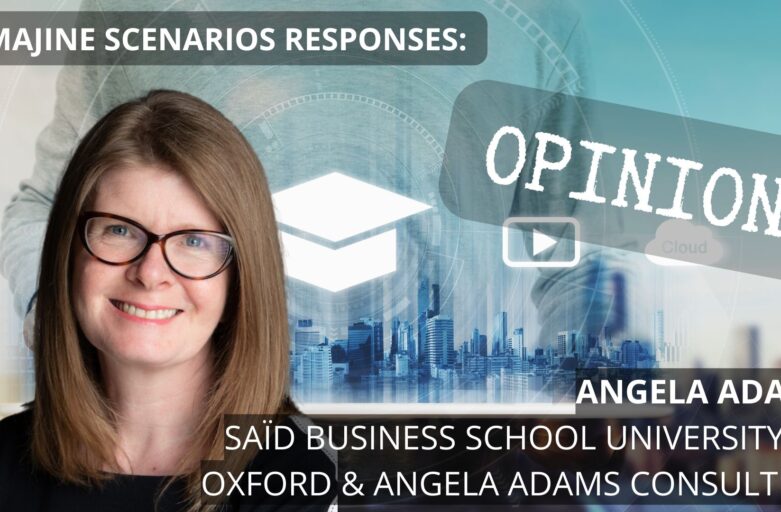In this response to the IMAJINE scenarios, Angela Adams, Associate Fellow, Saïd Business School University of Oxford and founder, Angela Adams Consulting, explores the future of executive education in each scenario. IMAJINE’s scenarios are being put to work this summer with EBSLG, the European Business School Librarians’ Group.
In 2019 the OECD estimated that at least 80 million workers in Europe were mismatched in terms of their qualifications and the workforce skills required across a wide range of industries[1].
In each of these scenarios, sparked by a mismatch between what traditional education was seen to be delivering, in particular for young people, and what was required by employers, executive education[2] continued to play an important role in reskilling and upskilling.
The scenarios were used to anticipate a future of executive education, provided as a snapshot-in-time description to outline the:
- Purpose and market
- Education experience, and
- Influence and/or role of advancing technologies
What follows are the author’s views, which in no way represent the views of any organisations the author is associated with.
Silver Citadel
In the first scenario, Silver Citadel, executive education’s purpose remains unchanged: to develop leaders (with an emphasis on upskilling and reskilling) alongside an emphasis on business/firm and economic growth.
In the new centralised pan-European state, executive education provision is determined by BigTech, who now lead partnerships with Business Schools (who had previously been the main providers). The sector, and these relationships, are now subject to regulation.
In this scenario the culture is one of ‘cradle to grave’ lifelong learning; technology is seen as the enabler of education. Scalability, achieved through the application of technology across all education sectors, has democratized executive education which is now exclusively experienced online. Advances in telecommunications and technologies (including AR/VR) provide the spaces that were so absent during the Covid-19 pandemic, and now enable people to foster relationships and successfully build communities of practice.
The responsibility for lifelong learning lies with the individual. The application of AI provides for personalisation both to identify education needs and suggest the most relevant and appropriate experiences. Digital passports, powered by blockchain technology, securely record education engagement and attainment and are used by all employers to match people to job roles.
Green Guardian
In the second scenario, the purpose of executive education is transformed – the primary purpose being to convene leaders to collectively solve society’s more pressing problems. There is less emphasis on executive education for skill building; the purpose of programmes is now to form action-oriented groups, who leverage diverse perspectives to create the conditions to achieve priorities that include well-being and sustainability.
University Business Schools emerge as the leaders of executive education in this scenario, providing thought leadership and pedagogy. Technology companies compete to partner with Business Schools, and this in turn has resulted in new education offerings to expand reach, and increase access within the EU and globally. These partnerships are subject to regulation.
The emphasis is on education as a social, collaborative experience with attention paid to creating learning spaces that promote inclusive cultures and behaviours. It is recognised that tackling 21st century challenges requires diverse thinking and diversity of leadership.
Advances in technology combined with a strategy to reduce travel, sees all executive education now delivered fully online. The increased emphasis on the arts, the humanities and philosophy has encouraged greater teaching and learning innovation – one example being the use of VR/AR for immersive, connected, networked learning experiences. Traditional education institutions, including Business Schools and universities are the drivers of teaching and learning innovation.
Silicon Scaffold
In the third scenario, Silicon Scaffold, the purpose of executive education is to ensure that leaders know how to learn, and to sustain digital literacy. The focus is on personal skills development, and personal efficacy. Education becomes focused on continuous reskilling and upskilling in order to remain highly employable.
The executive education market is fragmented, and highly competitive with Business Schools, consultancies, and education technology companies providing a wide range of options to engage citizens in pursuit of supporting lifelong learning. There is a healthy edtech start-up scene, driving the innovation of teaching and learning, and then adopted by the executive education sector.
Economic prosperity has been fueled by the trans-national relationships, driven by corporations. This has influenced access to executive education, which is provided to employees through corporate relationships with providers; corporations have taken responsibility for keeping their workforce skilled. There is no regulation of the partnerships formed by providers.
All teaching and learning is provided online; there is no provision made for in-person experiences, even within individual corporations. This is seen as optimising efficiency and also responding to the flexibility required of a hybrid workforce.
Advanced use of technology, including AR and VR provides for shared virtual spaces; the metaverse has become the space where people live and work, and now supports a just-in-time, ‘learning in the flow of work’ executive education experience. A result of this is that MBA and Executive MBA programmes no longer exist, and have been replaced by alternative credentials in recognition of skills mastery.
Patchwork Rainbow
In this final scenario, executive education in 2048 has evolved little since the Covid-19 pandemic. There is no one purpose of executive education, resulting in a large number of providers servicing different market niches.
Ownership and responsibility for executive education is squarely in the hands of each citizen, perpetuating the inequalities of the region. It is impossible for all citizens to access and engage with education with poor telecommunications infrastructure and access to connective technologies. In this scenario, not all citizens have access, an inequality that divides and is one where many are not able to build strategies to keep their skills up to date.
Business schools, keen to sustain their urban campuses, have continued to provide both in-person and online education experiences. Partnerships between top schools and technology companies have remained unregulated, utilising the most up to date technologies.
The widespread collapse of public trust in big institutions and big business fueled the decentralisation of executive education, with edtechs displacing incumbent business schools, creating further fragmentation in the provision of post-compulsory education.
[1] https://www.oecd.org/els/emp/OECD%20Skills%20for%20Jobs.pdf last accessed 12 May 2022
[2] For the purpose of this response to the Imajine Scenarios, Executive Education is the term used to describe both accredited and non-accredited programmes, usually part-time or in the form of short courses, that support the development of executives, business leaders and managers. They provide a focus on leadership development and/or increased understanding of specific roles or industries.


